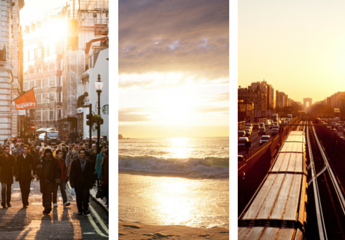The more time I spend researching on the internet, the more aware I’ve become of a “bubble” that surrounds my internet experience. My searches for specific products launches a barrage of ads on a sidebar for that which I just researched and a search of a different facet of an issue returns virtually the same sources I’ve already visited.
The area where it is most noticeable to me is when I’m researching recent news. It appears my bookmarks to the NY Times and Washington Post influence what site I see when I search. I feel as though I get a list of sources that are biased toward my point of view. I want to understand and consider possibilities, not be comforted in my views.
Don’t believe me? Check out Wall Street Journal’s Blue Feed, Red Feed, which lets readers see exactly how divergent social media feeds have become, depending on someone’s media diet. How did we get here and what are the implications?
Before the internet, We got our news from the major television networks and national, regional, and local newspapers who employed journalists and reporters who competed on scooping each other on the facts of a matter. The facts weren’t in question, but opinions surrounding these facts were largely limited to the editorial pages. These editorials formed the mainstream thinking.
With the internet came tools for individuals to democratize this traditional monopoly on the facts and social media sites that built the news feed. It quickly changed from a fairly simple way to read posts from friends to one based on an algorithm that optimized for ‘engagement.’
This shift from information to engagement is significant because it shifted the purpose of presenting content from pure relevance to keeping people happy and on that site (to present to advertisers).
This strategy by social media sites is effective. 62% of Americans with internet access consume a big portion of their news through Social Media . Facebook’s news feed is now the primary driver of traffic to news sites.
Most of the events that people read about will come through this feed. The danger is that most opinions will be shaped by a stream of information that is curated and limited by the things that will not make people uncomfortable — and certainly will not provide equal airtime to opposing viewpoints.
I don’t want the internet to console and comfort me. I want to connect to other cultures, other viewpoints, other ways of seeing the world. I want the sites I rely on to fulfill the promise of the internet, which is to connect with virtually anyone else on earth.
